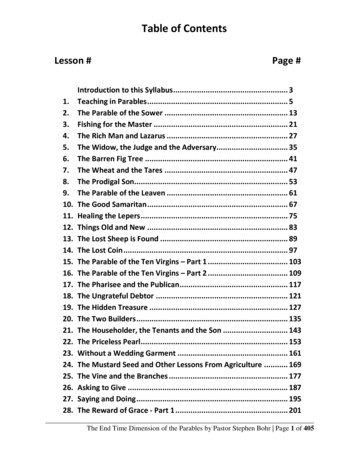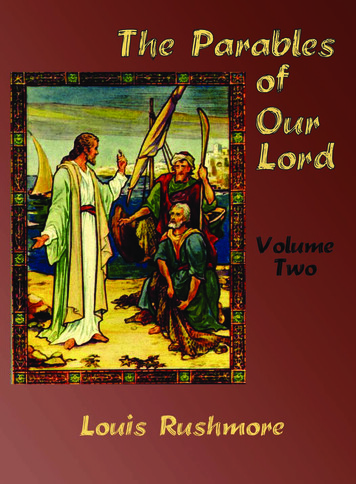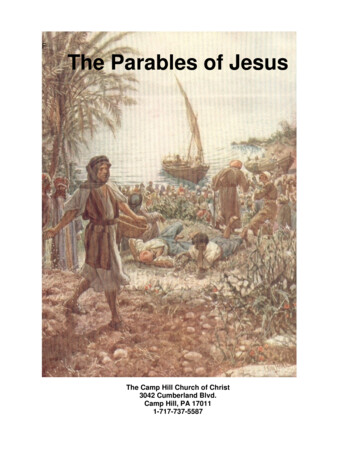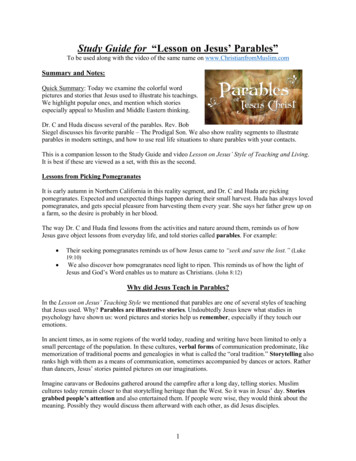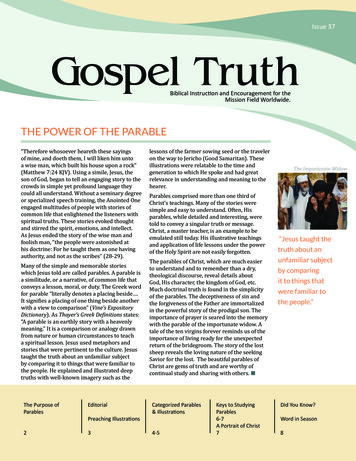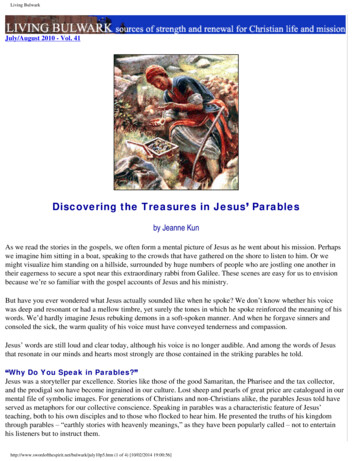
Transcription
Living BulwarkJuly/August 2010 - Vol. 41.Discovering the Treasures in Jesus’ Parablesby Jeanne KunAs we read the stories in the gospels, we often form a mental picture of Jesus as he went about his mission. Perhapswe imagine him sitting in a boat, speaking to the crowds that have gathered on the shore to listen to him. Or wemight visualize him standing on a hillside, surrounded by huge numbers of people who are jostling one another intheir eagerness to secure a spot near this extraordinary rabbi from Galilee. These scenes are easy for us to envisionbecause we’re so familiar with the gospel accounts of Jesus and his ministry.But have you ever wondered what Jesus actually sounded like when he spoke? We don’t know whether his voicewas deep and resonant or had a mellow timbre, yet surely the tones in which he spoke reinforced the meaning of hiswords. We’d hardly imagine Jesus rebuking demons in a soft-spoken manner. And when he forgave sinners andconsoled the sick, the warm quality of his voice must have conveyed tenderness and compassion.Jesus’ words are still loud and clear today, although his voice is no longer audible. And among the words of Jesusthat resonate in our minds and hearts most strongly are those contained in the striking parables he told.“Why Do You Speak in Parables?”Jesus was a storyteller par excellence. Stories like those of the good Samaritan, the Pharisee and the tax collector,and the prodigal son have become ingrained in our culture. Lost sheep and pearls of great price are catalogued in ourmental file of symbolic images. For generations of Christians and non-Christians alike, the parables Jesus told haveserved as metaphors for our collective conscience. Speaking in parables was a characteristic feature of Jesus’teaching, both to his own disciples and to those who flocked to hear him. He presented the truths of his kingdomthrough parables – “earthly stories with heavenly meanings,” as they have been popularly called – not to entertainhis listeners but to instruct 0p5.htm (1 of 4) [10/02/2014 19:00:56]
Living Bulwark“Parable” is derived from para and bolé, two Greek words that literally mean “something thrown or placed alongsidesomething else.” The Hebrew counterpart to “parable” is mashal, a term that broadly encompasses such figures andforms of speech as similes, analogies, metaphors, proverbs, riddles, and stories. Examples range from one-linesayings – “You are the light of the world” (Matthew 5:14) – to long illustrative stories like the parable of the sower(Luke 8:4-15) and dramatic narratives like the one about the unrighteous steward (Luke 16:1-13).Whatever their length, parables make comparisons to show how similar or different things are. In much the sameway that metaphors work, parables describe concepts that are unfamiliar or intangible in terms of concepts that arefamiliar, vivid, and concrete. The effect is that we transfer characteristics and opinions of objects, events, orsituations that we understand to those that are abstract or less familiar to us. In the parables, Jesus often helped hislisteners understand what God expected of them through narratives of events in this world: “The kingdom of heavenmay be compared to a king who gave a marriage feast . . .” (Matthew 22:2). In telling these stories, Jesus drew uponordinary objects and images, such as seed and salt, lamps and leaven, to communicate spiritual principles. As he toldhis followers, “From the fig tree learn its lesson” (Mark 13:28). He spoke the language of the people and usedparables to make his message accessible to everyone.What makes the parables different from other types of metaphor is that they don’t merely compare two individualobjects or events. Rather, the situations in the stories Jesus told provide insight into moral principles with broadapplications. So, while the elements of the individual parables were drawn from particular situations that could haveoccurred in that culture and at that point in history, their subjects are universal themes that transcend cultures andtime. The spiritual truths they contain about life, death, God, and human relationships resonate with all of humanexistence. The fact that the parables still speak to us today is evidence of their enduring nature.Moreover, Jesus frequently underscored spiritual truths of the parables through the use of hyperbole and bycontrasting opposite qualities such as virtue and vice, wisdom and foolishness, generosity and meanness of spirit.The parable of the rich man and poor Lazarus (Luke 16:19-31) is an animated portrayal of just such a contrast. Andthere is no clearer instance of exaggeration than the parable of the unforgiving servant, in which a slave who wasforgiven for a debt of 150,000 years’ wages refused to forgive a debt against him for only a hundred days’ wages(Matthew 18:23-35).That is not to say that the meaning of all of the parables was immediately apparent. Even the apostles frequently hadto ask Jesus to explain them. Like the best novels and poems written by human authors, these divine stories havemultiple layers of meaning and interpretation. For Jesus’ first-century audience as for us today, they are capable ofteaching moral truths, sparking new insights, and deepening our understanding of God and our faith.“Explain to Us the Parable”Why was speaking in parables one of Jesus’ favorite teaching methods? Telling a story is a powerful means ofcapturing people’s attention. A gifted storyteller has the ability to gain listeners’ interest, involve them in the story’sdrama, and hold them in suspense regarding its outcome. In addition, the pictorial language of parables and stories is.easier to remember than abstract thoughts. Thus, Jesus’ vivid parables function to fix chosen concepts and valuesfirmly in our memory and imagination.Jesus’ parables are not simply good or engaging stories – they are stories that are part of God’s revelation to us. Thelove of God, mercy and forgiveness, and the values of the kingdom are among the great themes of Jesus’ teachingthat he addressed by means of parables. In telling parables, Jesus revealed the heart of God and made his Father’swill known to 5.htm (2 of 4) [10/02/2014 19:00:56]
Living BulwarkJesus didn’t use his parables to enter into debate or argument with his listeners. But to make a point or explain theprinciples of God’s kingdom, he often posed challenging questions before beginning his parables. “Which one ofyou . . . ?” (Luke 15:4); “What do you think?” (Matthew 21:28). Sometimes the question came at the end of thestory: “Which of these three, do you think, was a neighbor to the man who fell into the hands of the robbers?” (Luke10:36).By questioning his hearers, Jesus drew them into the story and challenged them to figure out the message of theparable themselves – often by examining their own hearts and lives and reconsidering their conventional viewpointsor preconceived ideas. Above all, his parables were meant to evoke a personal response that would haveconsequences in each hearer’s life: They were to lead his audience to conversion, to a change in their attitude orbehavior toward God and one another. “Words are not enough; deeds are required. The parables are like mirrors forman: will he be hard soil or good earth for the word?” (Catechism of the Catholic Church, 546). Our heavenly Fatherspeaks to us through Jesus’ stories and calls us, through the promptings of the Holy Spirit, to a reorientation andtransformation of our lives. We are not to remain passive hearers.Frequently Jesus’ parables are provoking and paradoxical. Quite often their conclusions are surprising. Sometimesthe choice of characters and their roles confound expectations. The opening of the parable arouses interest; as thestory unfolds, the problem or issue emerges and suspense mounts. The climax and resolution may not only beunexpected but even disturbing, unsettling, or irritating – forcing the listeners to confront their own reactions. Insome instances, Jesus even leaves the parable open ended, compelling his hearers to finish the story for themselves.For example, we might wonder whether the elder son ever had a change of heart, set aside his resentment, and joinedin the celebration for his prodigal brother.The Written RecordWe should remember that Jesus’ parables were delivered “on the spot,” directed to his listeners in the variouscircumstances in which he encountered them. He seized “teachable moments” to address the crowds that followedhim. Originally spontaneous oral teachings, the parables of Jesus were first passed on among the earliest Christiansby word of mouth. Then the gospel Evangelists, relying on their own memories and the testimony and recollectionsof first-hand witnesses, wrote down the sayings and teachings of Jesus under the inspiration of the Holy Spirit.In recounting Jesus’ parables, the Evangelists would have probably used the original settings in which they weretold, if those were known. Or, they may have provided a framework suited to the content and sense of Jesus’teachings as well as to the thrust and structure of the gospel as a whole. The pastoral concerns of the early churchalso affected how the parables were recorded and interpreted in the gospels. For example, the lost sheep in theparable in the Gospel of Luke (15:4-7) is descriptive of sinners Jesus welcomed, whereas in Matthew 18:12-14, the“sheep gone astray” is identified with fallen-away Christians in need of special care by the church community.Such applications of Jesus’ parables should not be seen as misrepresentations or distortions of his original meaning.Rather, they indicate how the Evangelists and the early church, under the guidance of the Holy Spirit, recognized theliving quality of Jesus’ words and their relevance to every generation that hears them.“Let Anyone with Ears Listen!”Understanding and interpreting Jesus’ parables often demands some real effort, but delving deep enough to uncovertheir riches and treasures has its own rewards. Most of the parables are multilayered and cannot be reduced to asingle lesson or message. Such oversimplification would strip the stories of their mystery and severely limit theirimpact. On the other hand, Jesus’ parables are not allegories in which every detail in the story has a particular hiddensignificance and needs to be analyzed and broken like a secret code. Though many of the parables do containallegorical features and images that serve as symbols of divine realities, attempting a point-by-point july10p5.htm (3 of 4) [10/02/2014 19:00:56]
Living Bulwarkinterpretation of each detail has often led to some strange stretching of the imagination.If grasping the parables demands effort, allowing them to transform us requires not only hard work but open, willinghearts. We can understand Jesus’ stories and integrate their truths into our lives only when we desire to be close toGod – when we welcome his words with faith, yearn to do his will, and surrender ourselves to him in love. Perhapsthat’s why Jesus told his disciples that the “secrets of the kingdom of heaven” are not given to all (Matthew 13:11),and so often declared, “Let anyone with ears listen!” (Matthew 13:9, 43; Luke 8:8).Another way to “hear” Jesus’ parables is to read them aloud. Words come alive – and call forth life – when we givethem voice. In earlier centuries, people normally read aloud; reading silently is actually a fairly moderndevelopment. Although we often hear Jesus’ parables proclaimed in the Liturgy of the Word, it may be helpful to tryreading them aloud by yourself or within your faith-sharing group. By reading them with expression, you may gainnew insights. Such a practice can restore to the written word its original spoken quality and help you and your groupimagine that you are there, at the scene, listening to Jesus speak.As you progress through this guide, may you uncover all the treasures the Lord has for you, especially the “pearl ofgreat price” – Jesus himself. As you listen to his words, may your love for him increase so that your heart’s desire isto give all that you have to “purchase” that precious pearl.Jeanne Kun is President of Bethany Association and a senior woman leader in the Word of Life Community,Ann Arbor, Michigan, USA.This article is excerpted from Treasures Uncovered: The Parables of Jesus, by Jeanne Kun, 2005 The Word Among Us Press. Used with permission.This book can be ordered online at The Word Among Us Press.(c) copyright 2010 The Sword of the Spiritpublishing address: Park Royal Business Centre, 9-17 Park Royal Road, Suite 108, London NW10 7LQ, United Kingdomemail: t.net/bulwark/july10p5.htm (4 of 4) [10/02/2014 19:00:56].
Living BulwarkJuly/August 2011 - Vol. 51The pearl of great price and the treasure hidden ina field were a reminder of the vastness of what isat stake. Compared with that, all other successesare meaningless; men will make the kingdom theirown only if they are willing to sacrifice everythingelse for it.– Frank Sheed,To Know Christ JesusIn the SpotlightPearls Most PreciousThe Treasure and the PearlJoyfully Discovering the Kingdom.By Jeanne Kun[Jesus said to his disciples:] “The kingdom of heavenis like treasure hidden in a field, which someone foundand hid; then in his joy he goes and sells all that hehas and buys that field.“Again, the kingdom of heaven is like a merchant insearch of fine pearls; on finding one pearl of greatvalue, he went and sold all that he had and bought it.”- Matthew 13:44-46Jesus had just dismissed the crowds after telling them theparable of the weeds and the wheat. The disciples followedhim into a house, asking for an explanation. He providedone (Matthew 13:36-43) – and then promptly told themseveral more parables about the kingdom of God, includingthis pair about the hidden treasure and the pearl. Did thedisciples see their own experiences mirrored in these rk/july2011p14.htm (1 of 5) [11/02/2014 09:37:33]With their beautiful luster and glowing iridescence, pearlswere considered to have far greater value than gold in theancient world. A fragment of the oldest known pearljewelry was found in the sarcophagus of a Persianprincess who died in 520 B.C. Egyptians prized pearls somuch that they, too, were buried with them. In the firstcentury B.C., Julius Caesar decreed that only rulers of theRoman Empire could wear pearls, the ultimate symbol ofwealth and social stature. Cleopatra reportedly dropped apearl into a glass of wine and then drank it, simply to wina wager with Mark Antony that she could consume thewealth of an entire nation in a single meal. In A.D. 77,Pliny the Elder observed in his Natural History thatpearls were “the richest merchandise of all, and the mostsovereign commodity throughout the whole world.”Pearls are formed in the depths of the sea by oysters,mussels, and mollusks. Merchants in Jesus’ day went tothe Red Sea, the Persian Gulf, and the Indian Ocean insearch of pearls of the highest quality. Unios, the Latinword used to describe a large, fine pearl, literally means“unique” or “singular,” since no two of these naturalwonders are exactly alike.Pondering the Word1. What might it have cost the two men –besides money – to possess what they haddiscovered? What risks might have beeninvolved in making their purchases?
Living Bulwark2. Why do you think Jesus used hidden treasureand a pearl to describe the kingdom of heaven?What clues do these parables provide about thenature of God’s kingdom?3. Jesus notes that the man in the fieldexperienced joy even as he prepared to sell allof his possessions to buy the plot of land. Howdoes this further emphasize Jesus’ point aboutthe value of the kingdom of heaven? About thevalue of worldly things?The man who discovered the buried treasure soldeverything he possessed – perhaps a donkey, his wife’sweaving loom, his family’s house and furniture – to acquireit.The merchant, too, sold all he had to buy the exquisite pearlthat far surpassed any he had ever seen before.Each man’s response to his discovery was the same:Recognizing his find to be of inestimable worth, hesacrificed whatever was necessary to make it his own. Thepurchasers didn’t haggle over price. Nor did they bemoanwhat their acquisitions would cost them. On the contrary,they made their transactions joyfully, because what bothmen stood to gain was so tremendous that it made anymonetary cost, any sacrifice, any leap of faith insignificantin comparison.4. Jesus told these parables to his disciples inprivate, not to the crowds in general (Matthew13:36). What does this suggest to you? Whatlight does this shed on the meaning and cost ofdiscipleship?5. Matthew’s gospel places the parables aboutthe treasure and the pearl between Jesus’explanation of the parable of the weeds amongthe wheat and a similar parable about a netthrown into the sea, from which the good fishare separated from the bad. Why do you thinkMatthew put the parables in that order?Grow!1. Was your own “discovery” of Christseemingly accidental and unexpected or theresult of much searching on your part? How didyou respond to this discovery?2. What has your decision to follow Christ costyou? What part of the “purchase price” to obtainthe treasure did you find most difficult to pay?Are you withholding any part of the price? If so,why?Perhaps like the man who unexpectedly stumbled on thefortune hidden in the ground, the disciples hadn’t beenactively looking for the Messiah. Or they may have beenmore like the merchant, seeking something of great intrinsicworth that would enrich their 2011p14.htm (2 of 5) [11/02/2014 09:37:33]3. Which aspect of the parable speaks to youmost personally right now? The joy ofdiscovery? The value of the kingdom? The totalcommitment of self to God? Why?.4. In what ways have you shared the treasureyou’ve found in Christ with others? In whatways could you share that treasure even more?
Living BulwarkNo matter whether they had come upon their treasureinadvertently or had found it after a long search, thedisciples had responded like the men in the parable.5. How does the way you use your resources –your talents, time, money – reflect the value youplace on God’s kingdom?Reflect!1. Making Jesus and the kingdom of heaven ourgreatest treasure affects the other priorities andgoals in our lives. Consider what adjustmentsyou might need to make to better reflect thevalue you place on Jesus and building hiskingdom.The disciples had given up everything that previouslydefined their lives – their livelihoods, their homes, and theirfamilies – to follow an itinerant rabbi who they believed tobe the long-awaited Messiah (Mark 1:16-20).Following Jesus required total surrender and commitment(Matthew 16:24-26; Luke 9:23, 14:26-33). It also requiredan unwavering faith that the kingdom Jesus wasinaugurating was truly the “pearl of great price.” Throughthis pair of parables, Jesus reassured them that, yes, whatthey had given up could not even begin to compare withwhat he would give them in return.“Truly I tell you, there is no one who has left house or wifeor brothers or parents or children, for the sake of thekingdom of God, who will not get back very much more inthis age, and in the age to come eternal life” (Luke 18:2930).2. Reflect on the following passages to enhanceyour understanding of the parables you havejust studied:The price of wisdom is above pearls. (Job28:18)If you seek [wisdom] like silver,and search for it as for hidden treasures –then you will understand the fear of the LORDand find the knowledge of God. (Proverbs 2:45)Jesus said to [the rich young man], “If you wishto be perfect, go, sell your possessions, andgive the money to the poor, and you will havetreasure in heaven; then come, follow me.”When the young man heard this word, he wentaway grieving, for he had many possessions.(Matthew 19:21-22)The message of these brief parables offers encouragementto us as well. It’s not easy to make a radical investment ofourselves in Christ. It requires an act of faith to livesingleheartedly for him. We may find ourselves at differentstages in our journey – perhaps reluctant to sacrifice certainthings in our lives, perhaps giving up something for a timeonly to take it back.[Jesus] said to his disciples, “Do not be afraid,little flock, for it is your Father’s good pleasureto give you the kingdom. Sell yourpossessions, and give alms. Make purses foryourselves that do not wear out, an unfailingtreasure in heaven, where no thief comes nearand no moth destroys. For where your treasureis, there your heart will be also.” (Luke 12:3234)But there is literally everything to gain by persevering. Andas we come to joyfully recognize “the surpassing worth ofknowing Christ Jesus” (Philippians 3:8), we become moreYet whatever gain I had, these I have come toregard as loss because of Christ. More thanthat, I regard everything as loss because of 1p14.htm (3 of 5) [11/02/2014 09:37:33]
Living Bulwarklike the men in the parables – rushing off to “sell” all wehave for the great treasure of Jesus reigning in our lives.In the Spotlightsurpassing value of knowing Christ Jesus myLord. For his sake I have suffered the loss of allthings, and I regard them as rubbish, in orderthat I may gain Christ and be found in him.(Philippians 3:7-9)Wisdom from the Church FathersBy the pearl of price is to be understood the sweetness of the heavenlykingdom, which, he that has found it, sells all and buys. For he that, asfar as is permitted, has had perfect knowledge of the sweetness of theheavenly life, readily leaves all things that he has loved on earth; all thatonce pleased him among earthly possessions now appears to have lostits beauty, for the splendor of that precious pearl is alone seen in hismind.Act!This week share about the treasure you’vefound in Christ and the joy of this discoverywith at least one person with whom you havenever discussed your faith.In the Spotlight– St. Gregory the Great, Homilies on the GospelsChrist is the treasure which was hid in the field, that is, in this world (for“the field is the world”); but the treasure hid in the Scriptures is Christ,since he was pointed out by means of types and parables. . . . It [theOld Testament law and prophecies] is a treasure, hid indeed in a field,but brought to light by the cross of Christ.– St. Irenaeus, Against HeresiesA man seeking goodly pearls has found one pearl of great price; that is,he who is seeking good men with whom he may live profitably, findsone alone, Christ Jesus, without sin.– St. Augustine, Quaest. in Matt.Excerpted from Treasures Uncovered: The Parables of Jesus,by Jeanne Kun (The Word Among Us Press, 2005). Used withpermission. This book can be ordered online.Jeanne Kun is President of Bethany Association and a senior womanleader in the Word of Life Community, Ann Arbor, Michigan, USA.Contemporary VoicesThe traditional interpretation sees the farmer and themerchant as disciples or would-be disciples. But it ispossible that both are images of God himself, who hasgiven what is most precious to him, his own Son (seeMatthew 21:37), to purchase ( redeem) his people.Perhaps it is only when the human person realizes theextent of God’s extravagance that he can respond withsimilar totality.– George Montague, SM, Companion God:A Cross-Cultural Commentaryon the Gospel of MatthewThe gospel parables of the treasure and the pearl ofgreat price, for which one sells all one’s possessions, areeloquent and effective images of the radical andunconditional nature of the decision demanded by thekingdom of God. The radical nature of the decision tofollow Jesus is admirably expressed in his own words:“Whoever would save his life will lose it; and whoeverloses his life for my sake and the gospel’s will saveit” (Mark 8:35).– Pope John Paul II, The Splendor of Trutth(c) copyright 2011 The Sword of the Spiritpublishing address: Park Royal Business Centre, 9-17 Park Royal Road, Suite 108, London NW10 7LQ, United Kingdomemail: t.net/bulwark/july2011p14.htm (4 of 5) [11/02/2014 09:37:33].
Living BulwarkJuly/August 2012 - Vol. 61Luke 12:13-21The Rich Fool.“You Can’t Take It with You”13 Someone in the crowd said to him, “Teacher, tell mybrother to divide the family inheritance with me.” 14But hesaid to him, “Friend, who set me to be a judge orarbitrator over you?” 15And he said to them, “Take care!Be on your guard against all kinds of greed, for one’s lifedoes not consist in the abundance of possessions.”16Then he told them a parable: “The land of a rich manproduced abundantly. 17And he thought to himself, ‘Whatshould I do, for I have no place to store my crops?’18Then he said, ‘I will do this: I will pull down my barnsand build larger ones, and there I will store all my grainand my goods. 19And I will say to my soul, Soul, you haveample goods laid up for many years; relax, eat, drink, bemerry.’ 20But God said to him, ‘You fool! This very nightyour life is being demanded of you. And the things youhave prepared, whose will they be?’ 21So it is with thosewho store up treasures for themselves but are not richtoward God.”.By Jeanne KunThe parable. shows the pointlessness of greed.Possessions, even an abundance of possessions,cannot give us security; they can only give us anillusion of security. And that illusion can distract usfrom the true source of our security, God’s care for us.The folly of the rich farmer lay not in his having fullbarns, but in his believing that his full barns were all heneeded.– George Martin, God’s Word TodayThe request that prompted Jesus to tell this parable mightseem to be a rather innocent one. Someone in the crowd justwanted to receive his fair share of his family’s possessions.But to Jesus, the man’s concern with money betrayed thefact that he had missed the point – he had focused hisattention on the things of this world rather than storing uptreasures in the kingdom of God.So Jesus distanced himself from this man’s personalconcerns and proceeded to tell a story about a man with somuch earthly wealth that he thought his future was secured.The rich landowner had “ample goods for many years,” sowhy not “relax, eat, drink, [and] be merry”? It’s easy p8.htm (1 of 5) [10/02/2014 19:04:54]In the SpotlightThe Insatiable Desire for MorePleonexia is the Greek word for “greediness” or“covetousness.” It carries overtones of an insatiabledesire for more and more. The verb form is commonlyused to describe the actions of those who try to takeadvantage of others or strive ambitiously for gain, and theadjective is descriptive of one who never has enough.Jesus named pleonexia, or avarice, one of the evils thatcome from within the heart and defile a person (Mark 7:2123). St. Paul included it among the characteristics of theungodly and wicked (Romans 1:29) and of those who arealienated from God by their hardness of heart (Ephesians4:19).As Christians who have been buried with Christ inbaptism and raised up with him, we are to “put to death”in ourselves “whatever is earthly: fornication, impurity,passion, evil desire, and greed –pleonexia – (which isidolatry)” (Colossians 3:5).
Living Bulwarkimagine this man at his leisure, enjoying the fruits of hislabors.So why is this man a fool? Don’t we all take measures toprovide for our future security? The problem with the manin the parable is that he didn’t have his priorities straight.The wealthy man put all his trust in his possessions insteadof putting his trust in God. He sought happiness andsecurity by stockpiling his wealth, not even thinking ofsharing it with others. We know from his monologue thathe was self-centered – the personal pronoun “I” appears sixtimes and the possessive pronoun “my” five times – so thepossibility of sharing his abundance with others apparentlynever even crossed his mind. He didn’t thank God for hisprosperity, nor did he seek advice from anyone about howto put his surplus to good use. His only thought was to builda bigger barn in which to store his wealth for his ownfuture. He was so preoccupied with his possessions that heidolized them, letting them usurp God’s rightful place in hislife.Suddenly, when the man was confronted with his imminentdeath, the senselessness of his actions was made plain tohim. God himself says: “You fool! This very night your lifeis being demanded of you. And the things you haveprepared, whose will they be?” (Luke 12:20).The wealthy landowner’s actions and his perspective on lifewere based on a set of falsehoods – which is why he wascalled a fool. How easy it is to deceive ourselves just as thisrich fool did. We’re susceptible to the same all-too-humantendencies that he was, and our vision can be just as shortsighted and distorted. We try to control our own destiny,when it is God who has ultimate control. Perhaps we baseour security in riches and things we can see, forgetting thatwe can only be secure in God. Or, focused on our own wellbeing and interests, we neglect the needs of our neighbor.We forget that all we have comes from God – it’s not reallyours. We mistakenly live for the present, giving no thoughtto securing our eternal future.The parable of the rich fool is another of Jesus’ pointed anddisquieting reminders that we are not to invest ourselves inthe perishable riches of earth, but rather in the enduringriches of heaven, that will gain us eternal interest (Luke12:21, 33). When we perceive the truth about God and thefullness of life that he offers us, we’ll be eager to be “richtoward God” (12:21). “For where [our] treasure is, therehttp://www.swordofthespi
Living Bulwark July/August 2010 - Vol. 41. Discovering the Treasures in Jesus’ Parables by Jeanne Kun As we read the stories in the gospels, we often form a mental picture of Jesus as he went about his mission. Perhaps we imagine him sitting in a boat, speaking to the crowd
